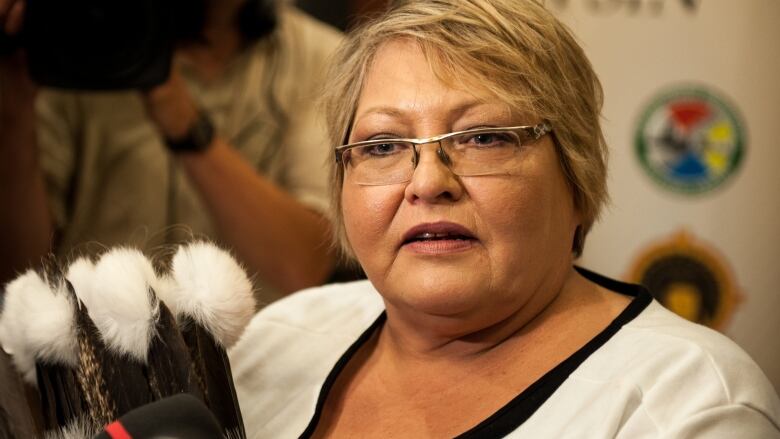FSIN vice-chief Heather Bear wants provincial child apprehensions halted
Bear says too many Indigenous children in provincial custody, wants more placements on First Nations

A vice-chief at the Federation of Sovereign Indigenous Nations wants Saskatchewan social services to stop taking First Nations children out of their homes.
In February, there were approximately 5,000 children in care in Saskatchewanand about 4,000 of them were Indigenous.
"Our children being taken away from their communities," FSIN fourth vice-chief Heather Bear told CBC Radio's The Afternoon Edition. "They never hear their language, they never touch their land and they will never be registered as treaty Indians."
The issue of provincial social services apprehending Indigenous children has been a contentious issue for years, with some people making comparisons to the Sixties Scoop, a policy that placed thousands of Indigenous children with white families across North America from the '60sto the '80s.
Bear emphasized that the safety of children remains a serious issue. However, she believes more resources must be given to Indian Child and Family Services agencies located across the province.
"We have First Nations social workers, we have families and communities that are really getting involved in the programming," she said.
As well, she said First Nations families have a difficult time becoming approved as foster homes, which would improve the situation.
"I've talked to many first-line workers and they're really frustrated with all the barriers to get First Nations approved," she said. "Even people that live in urban settings."
Working closer
The Ministry of Social Services saidthere has been a conscious shift in the past several years towardconnecting youth with their First Nations and families.
The ministry said it's trying to become more sensitive to the needs of First Nations children and work closer with elders and community-based organizations.
While the FSIN has also been working closer with the ministry, Bear says she often feels like the province isn't listening.
"It's about authority and control," she said. "At the end of the day, it's about assimilating us, tearing the culture, the tradition, the language from our children."
The ministry said most often, children are placed with a family member, or at the very leastwith someone familiar to them. It said roughly 60 percent of apprehended children are placed with extended family or significant people in their lives.
with files from CBC Saskatchewan's Afternoon Edition












_(720p).jpg)


 OFFICIAL HD MUSIC VIDEO.jpg)
.jpg)



























































































